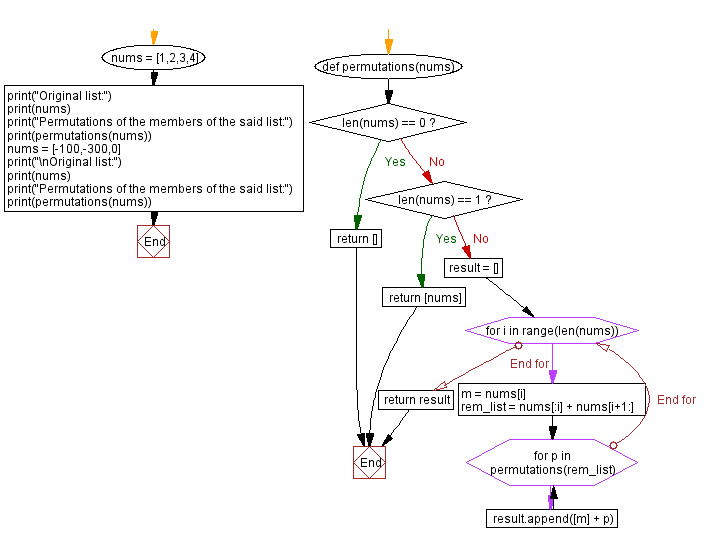Python List Advanced Exercise - Permutations of the members of a list
3. Find All Permutations of a List
Write a Python function that finds all the permutations of the members of a list.
In mathematics, the notion of permutation relates to the act of arranging all the members of a set into some sequence or order, or if the set is already ordered, rearranging (reordering) its elements, a process called permuting. These differ from combinations, which are selections of some members of a set where order is disregarded
Sample Solution:
Python Code:
# Define a function to generate all permutations of a list of numbers
def permutations(nums):
# Base case: If the input list is empty, return an empty list as there are no permutations.
if len(nums) == 0:
return []
# Base case: If the input list has only one element, return a list containing that element as the only permutation.
if len(nums) == 1:
return [nums]
# Initialize an empty list 'result' to store permutations.
result = []
# Iterate over the elements of the input list.
for i in range(len(nums)):
# Select an element 'm' at index 'i'.
m = nums[i]
# Create a new list 'rem_list' that contains all elements except 'm'.
rem_list = nums[:i] + nums[i+1:]
# Recursively find permutations of 'rem_list'.
for p in permutations(rem_list):
# Add 'm' to the beginning of each permutation in 'p' and append it to the 'result' list.
result.append([m] + p)
# Return the list of all permutations.
return result
# Create a list of numbers
nums = [1, 2, 3, 4]
# Print the original list
print("Original list:")
print(nums)
# Call the permutations function and print the result, which is a list of all permutations of 'nums'.
print("Permutations of the members of the said list:")
print(permutations(nums))
# Create another list of numbers
nums = [-100, -300, 0]
# Print the original list
print("\nOriginal list:")
print(nums)
# Call the permutations function with the second list and print the result, which is a list of all permutations of 'nums'.
print("Permutations of the members of the said list:")
print(permutations(nums))
Sample Output:
Original list: [1, 2, 3, 4] Permutations of the members of the said list: [[1, 2, 3, 4], [1, 2, 4, 3], [1, 3, 2, 4], [1, 3, 4, 2], [1, 4, 2, 3], [1, 4, 3, 2], [2, 1, 3, 4], [2, 1, 4, 3], [2, 3, 1, 4], [2, 3, 4, 1], [2, 4, 1, 3], [2, 4, 3, 1], [3, 1, 2, 4], [3, 1, 4, 2], [3, 2, 1, 4], [3, 2, 4, 1], [3, 4, 1, 2], [3, 4, 2, 1], [4, 1, 2, 3], [4, 1, 3, 2], [4, 2, 1, 3], [4, 2, 3, 1], [4, 3, 1, 2], [4, 3, 2, 1]] Original list: [-100, -300, 0] Permutations of the members of the said list: [[-100, -300, 0], [-100, 0, -300], [-300, -100, 0], [-300, 0, -100], [0, -100, -300], [0, -300, -100]]
Flowchart:

What is the time complexity and space complexity of the following Python code?
def permutations(nums):
if len(nums) == 0:
return []
if len(nums) == 1:
return [nums]
result = []
for i in range(len(nums)):
m = nums[i]
rem_list = nums[:i] + nums[i+1:]
for p in permutations(rem_list):
result.append([m] + p)
return result
Time complexity - The time complexity of the said code is O(n!), where n is the length of the input array “nums”. This is because the code generates all possible permutations of the input array, and there are n! possible permutations.
Space complexity - As the code generates a list of n! permutations, each of which contains n elements, the space complexity of the code is also O(n!). Therefore, the total amount of space used by the code is O(n *n!), which simplifies to O(n!).
For more Practice: Solve these Related Problems:
- Write a Python function to generate all permutations of a list using a recursive approach.
- Write a Python function to produce all unique permutations for a list that may contain duplicate elements.
- Write a Python function to generate and print permutations of a list without using itertools.permutations.
- Write a Python function to list all permutations of a list in lexicographical order using a backtracking algorithm.
Go to:
Previous: Length of the longest increasing sub-sequence.
Next: Find the kth smallest element in a list.
Python Code Editor:
What is the difficulty level of this exercise?
Test your Programming skills with w3resource's quiz.
